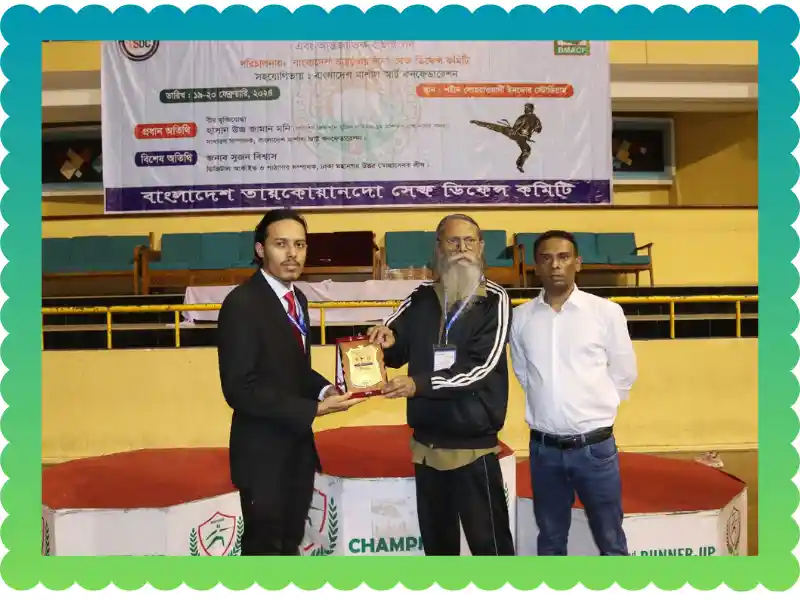
As I reflect on my journey to becoming a skilled Taekwondo referee in 2024, I am filled with a sense of gratitude for the experiences and opportunities that have shaped my path in the martial arts world. From my early days as a passionate practitioner to my current role as a respected referee on both national and international stages, every step of this journey has been a testament to dedication, perseverance, and continuous learning.
Have you ever had the desire to become a skilled taekwondo referee? In 2024, I accomplished that goal, and I’m here to tell you all about my journey. Whether you’re a taekwondo fan or just interested in the process, I hope my story can motivate and assist you as you pursue becoming a skilled taekwondo referee.
Embracing Taekwondo: A Foundation for Refereeing Excellence
My journey as a Skilled Taekwondo Referee began with a deep-rooted passion for the sport. From the moment I stepped onto the mat, I was captivated by the beauty and discipline of Taekwondo, and I dedicated myself wholeheartedly to mastering its techniques and principles. As I progressed through the ranks, earning my black belt and competing in national and international tournaments, I gained invaluable insights into the intricacies of Taekwondo sparring and forms.
Transitioning to Coaching and Officiating: A New Perspective
With years of training and competition, I felt compelled to share my knowledge and expertise with others. Thus, I embarked on a coaching journey, guiding aspiring athletes toward their goals and instilling in them the values of discipline, respect, and sportsmanship that define Taekwondo. During this time, I also discovered a passion for officiating, as I recognized the vital role of referees in ensuring fair play and upholding the integrity of the sport.
Pursuing Education and Certification: The Path to Refereeing Excellence
To formalize my commitment to refereeing, I pursued a diploma course in Taekwondo officiating, where I deepened my understanding of the rules, regulations, and protocols governing Taekwondo competitions. Under the guidance of experienced instructors and mentors, I honed my skills in match management, decision-making, and conflict resolution, preparing myself for the rigors of officiating at the highest levels of competition.
Practical Experience: Learning Through Observation and Practice
As I transitioned from the classroom to the arena, I immersed myself in practical refereeing experience, shadowing seasoned officials at local, regional, and national tournaments. I observed their techniques, learned from their insights, and gained confidence in my ability to officiate matches with professionalism and impartiality. With each event, I grew more comfortable in my role as a Skilled Taekwondo Referee, developing the keen judgment and situational awareness required to make split-second decisions in the heat of competition.
Mentorship and Guidance: Nurturing Professional Growth
Throughout my journey, I have been fortunate to receive mentorship and guidance from esteemed colleagues and mentors who have generously shared their wisdom and expertise. Their mentorship has been instrumental in shaping my development as a referee, providing me with invaluable feedback, encouragement, and support as I navigate the challenges and opportunities of officiating in the ever-evolving landscape of Taekwondo.
Embracing Challenges: Overcoming Adversity and Refining Skills
Like any journey, my path to becoming a skilled Taekwondo referee has been marked by challenges and setbacks. From controversial calls to intense scrutiny from athletes and spectators, I have faced moments of doubt and adversity that have tested my resolve and resilience. Yet, it is through these challenges that I have grown stronger, learning from my mistakes and emerging as a more confident and competent referee.
The Evolution Continues: A Lifelong Commitment to Excellence
As I look ahead to the future, I am filled with a sense of optimism and excitement for the opportunities that lie ahead. While I have achieved success as a Taekwondo referee in 2024, I recognize that my journey is far from over. Refereeing, like Taekwondo itself, is a lifelong pursuit of excellence, and I am committed to continuous learning, growth, and improvement as I strive to uphold the highest standards of officiating in the years to come.
How do you become a Taekwondo Referee?
To become a certified Skilled Taekwondo Referee, you will need to undergo training and certification from a recognized Taekwondo organization or federation. It’s important to gain experience by officiating at local and regional Taekwondo events and to stay up to date on the rules and regulations of Taekwondo competitions. Developing good judgment and decision-making skills is crucial for fair and accurate officiating.
Additionally, networking with other referees and officials in the Taekwondo community can help you learn and grow in your role. Gaining experience by officiating at local tournaments and events can also contribute to your success as a Taekwondo referee.
How much do professional Referees make?
The average salary for a professional referee in the United States ranges from $40,000 to $55,000 per year. However, referees in top leagues or for major events can earn significantly more, with some making six-figure incomes.
Additionally, referees may also receive additional compensation for travel expenses and accommodations. Salaries for referees can vary widely depending on the level of competition and the sport. In addition to their salary, many professional referees also have other full-time or part-time jobs to supplement their income.
How many years does it take to Master Taekwondo?
Mastering Taekwondo requires many years of dedicated practice and training. The amount of time it takes can vary depending on the individual and their commitment to the sport. Generally, it takes at least 3-5 years to earn a black belt in Taekwondo. and many more years of training and experience to truly master the art. It demands discipline, perseverance, and continuous learning to reach a high level of skill in Taekwondo.
How many officials are there in Taekwondo?
In Taekwondo, there are usually multiple officials involved in a match or competition. such as referees, judges, timekeepers, and scorekeepers. The number of officials can vary based on the level of the competition and the specific rules being followed, but they work together to ensure fair play and accurate scoring.
How do you become a National Referee?
To become a National Referee, you first need to become a certified referee in your sport. This involves completing a training and certification program. as well as gaining experience officiating games at different levels. Once you have the necessary certification and experience, you can apply to become a National Referee through your sport’s governing body.
This may involve meeting specific criteria such as a certain number of years of experience. passing an exam, and demonstrating a high level of officiating skill. It’s also important to stay current with rule changes and updates in your sport to maintain your National Referee status. Becoming a National Referee is a great achievement and requires dedication and hard work.
What is the job of a Referee in Taekwondo?
If you’ve ever wondered about the role of a referee in Taekwondo, you’re in the right place. Let’s dive into everything you need to know about their important job in ensuring fair play and safety in the sport.
1. It is important to ensure that fair play and adherence to the rules of the sport are maintained.
2. The match should be monitored for any illegal or dangerous moves.
3. Points should be awarded for successful techniques and deducted for rule violations.
4. Decisions regarding penalties and disqualifications should be made as necessary.
5. Control and order should be maintained in the ring.
6. The referee should serve as a neutral and unbiased authority figure in the match.
Taekwondo Referee salary per month
The salary of a Taekwondo referee can vary widely depending on factors such as location, level of experience, and the specific event or organization they work for. In general, Taekwondo refereeing is often a part-time or volunteer role, and referees may receive compensation on a per-event basis rather than a monthly salary.
Taekwondo Referee salary per month in the USA
In the United States, the salary of a Taekwondo referee can vary depending on their experience and level of certification. On average, a Taekwondo referee can make anywhere from $300 to $600 per day for officiating at competitions. Keep in mind that this is just an average and the actual salary may vary based on the specific event and the referee’s level of experience. Additionally, some referees may also receive additional compensation for travel and accommodations when officiating at major competitions.
Taekwondo Referee salary per month in Indea
The average salary for a Taekwondo referee in India is typically around $500 to $700 per month. However, experienced referees may earn higher salaries, up to $1000 per month. Salaries can vary based on factors such as location, experience, and the level of competition. Referees may also receive additional income from coaching or conducting training sessions. It’s important to research and negotiate for fair compensation based on your qualifications and experience.
How much does a Taekwondo instructor earn in the US?
Taekwondo instructors in the US typically earn between $25,000 and $45,000 per year, but this can vary based on factors such as experience, location, and the size of the martial arts school. Instructors with higher ranks and a strong student following may also earn additional income through private lessons and seminars.
Many instructors have the opportunity to earn extra through competitions, demonstrations, and teaching special classes. Overall, the earning potential for a Taekwondo instructor in the US can be quite competitive and rewarding.
How many rules are there in the Taekwondo Referee?
In Taekwondo, referees must adhere to specific rules and guidelines to ensure fair and safe competition. These rules encompass scoring, timing, conduct, and safety protocols. Referees need to be thoroughly trained and knowledgeable to consistently enforce these rules throughout the match. Referees must undergo extensive training and have a strong understanding of all the rules to effectively officiate matches.
Latest Taekwondo Referee Rules PDF Download Free
If you need the most up-to-date Taekwondo referee rules, you’re in luck! We have a free PDF download available for you. This will help you stay informed about all the latest regulations and guidelines for Taekwondo refereeing in an easy and accessible format.
Taekwondo Referee Rules PDF Download Free (1)
Taekwondo Referee Rules PDF Download Free (2)
Taekwondo Referee Rules PDF Download Free (3)
Conclusion,
My journey to becoming a skilled Taekwondo referee in 2024 has been a testament to my dedication, perseverance, and passion for the sport. From my humble beginnings as a practitioner to my current role as a respected official. Every step of this journey has been guided by a deep love for Taekwondo and a desire to contribute to its growth and development. As I continue to refine my skills and embrace new challenges, I am grateful for the opportunities that Taekwondo has afforded me and excited for the journey that lies ahead.
FAQ
Can Taekwondo be a career?
Certainly! Taekwondo can be a viable career choice for those who are passionate about the sport. Many people make a living teaching classes, coaching athletes, or competing professionally. There are also opportunities to work in fitness centers, and schools, or even start your own martial arts studio. With dedication and hard work, Taekwondo can be a viable career choice for those who truly love the sport.
Is there a Referee in Taekwondo?
Yes, in Taekwondo, there is a referee who oversees and enforces the rules of the competition. The referee ensures that the match is conducted fairly and that the competitors follow the guidelines of the sport. They also have the authority to deduct points or disqualify a competitor if they break the rules. The presence of a referee adds a level of accountability and fairness to the sport of Taekwondo.
What is the salary of a referee in India?
The salary of a referee in India can vary depending on factors such as the sport, level of competition, and governing body. Referees in popular sports like cricket or football may earn higher incomes, especially at the professional level. While referees in less mainstream sports or amateur competitions might receive lower compensation. Specific salary figures for referees in India are not widely available and can vary significantly based on individual circumstances.
Can you make money in Taekwondo?
Yes, it is possible to earn a living through Taekwondo. Many people make money as professional Taekwondo instructors, coaches, and competitors. Some also offer private lessons, workshops, and seminars for income. Additionally, successful Taekwondo practitioners can endorse products, become brand ambassadors, and participate in competitions with cash prizes. While it requires hard work and dedication, making money in Taekwondo is achievable.
What does Kyorugi mean in Taekwondo?
In Taekwondo, “Kyorugi” (겨루기) refers to the sparring aspect of the sport. It involves controlled, full-contact combat between two practitioners, following specific rules and regulations set by the governing body. Kyorugi emphasizes the application of Taekwondo techniques in a dynamic and competitive setting, promoting physical fitness, strategy, and sportsmanship.
What is Kyukpa in Taekwondo?
In Taekwondo, “Kyukpa” (격파) refers to the discipline of breaking. It involves demonstrating one’s power and technique by breaking boards, bricks, or other materials using various Taekwondo techniques, such as strikes, kicks, or hand techniques. Kyukpa is often practiced as part of testing for belt promotions or as a demonstration of skill and proficiency in Taekwondo.
How do you become a professional Taekwondo player?
To become a professional Taekwondo player, it is important to commit yourself to intense training and practice. This involves mastering the basic techniques, building physical strength and agility, and refining mental focus and discipline. Seeking guidance from experienced coaches and participating in competitive tournaments can help you gain valuable experience and recognition in the Taekwondo community. It is essential to stay committed and persistent in your pursuit of excellence in the sport.
What are some of the prohibited acts in the Kyorugi competition?
In the Kyorugi competition, there are specific acts that participants must avoid. These include hitting below the belt, hitting the back of the head, hitting while the opponent is down, grabbing or holding onto the opponent, intentionally falling, and using excessive force or aggression. These rules are in place to ensure the safety and fair play of all participants. All participants need to be aware of and follow these rules to ensure a safe and respectful competition environment.

Founder, Owner, and CEO of TaekwondoKing.
He is one of the top 100 martial artists in the World and among the top 20 referees in Bangladesh.
Ehatasamul Alom is an esteemed Kukkiwon Certified Taekwondo 3rd Dan Black Belt with over 15 years of experience in this dynamic martial art. Born in Rajshahi, Bangladesh, Ehatasamul’s journey with Taekwondo began at the tender age of seven. His passion led him to compete at national and international levels, where he has bagged numerous awards and honors. He is also a member of the Taekwondo National Referee Panel.
With a Bachelor’s degree in Sports Science from the prestigious Rajshahi University, Ehatasamul has a deep understanding of the technical and scientific aspects of martial arts and some other martial arts.
In 2022, Ehatasamul created the “TaekwondoKing.com” to share his knowledge, Free Resources, Values, and Real experiences. His articles focus on Taekwondo training techniques, competition strategies, Sport Products Reviews, and the art’s rich history and philosophy. He also writes about the importance of mental fortitude and discipline, key aspects of his teaching philosophy. He has already launched many sports, Taekwondo, and health-related Free online tools. His goal is to inspire both beginners and seasoned practitioners worldwide through insightful and engaging content.
If you need any help, contact Ehatasamul Alom at any time.




